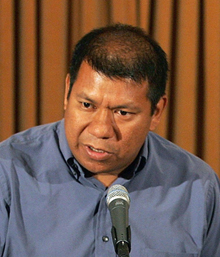Pablo Alvarado on ordinary people doing the extraordinary
CBS News asked noted figures in the arts, business and politics about their experience in today's civil rights movement, or about figures who inspired them in their activism.
Pablo Alvarado, executive director, National Day Laborer Organizing Network (NDLON)
What needs to happen in the next 50 years for equality to be fully realized in the U.S.?
When the federal government sued the state of Arizona for SB1070 (the racial profiling law it passed in 2010), some argue that it did not do so on civil rights grounds because it would also be indicting its own national practices if it did.
Unfortunately, we have far to go to achieve equality. The distance to that goal is reflected in the number of people in prison, the number of people who will be deported this year, even the number of people who lost their homes and were thrown into economic insecurity during the recession.
For poor people and people of color, daily life is a reminder of the work still to do -- whether it is being followed or refused service as a customer in a store because of your accent or your skin color, the humiliation and hardship of being sent away from a worksite after a hard day of labor by an employer who refuses to you pay the wages you earned with the sweat of your brow, or the looming threat of being uprooted from your family because of your documentation status.
Fifty years after the civil rights struggles of the last century, we have learned many of the lessons but still have to work to maintain, recover and advance upon the gains of that time. Martin Luther King, Jr. taught us the power of love. Malcolm X taught us that civil rights are human rights and a civil rights struggle is part of a global movement. And the people who lost their lives, blistered their feet, and risked their futures to be seen as fully human taught us that change does not come from the political class alone.
It was Frederick Douglass in the middle of the 19th century that said that power concedes nothing without demand, it never has and it never will. And it was Dr. Cornel West who added that to make change we must let the suffering speak.
As we commemorate the passage of the Civil Rights Act, we remember that change doesn't start in the halls of Congress; it eventually gets codified there. Justice starts when people lift their heads and say, "No more" -- as they did in Montgomery, at the workplaces and day laborer corners, inside the cells of police departments and behind the walls of detention centers.
With that in mind, there are policies that we can recommend for a more equal society: a halt to deportations; a raise of the minimum wage; better regulations for unsafe workplaces. But the truth is that for those policies to have meaning or take hold, it requires the people affected by them to be active, to be vigilant, and to be powerful in shaping our democracy.
People in motion are the motor that opens hearts and minds, expands our circle of compassion, and eliminates the fears that divide us. As with the civil rights movement, it is ordinary people doing the extraordinary that will continue history's march forward to defend and win rights for us all.
For more info:
- National Day Laborer Organizing Network (NDLON)
- Follow the NDLON on Twitter and Facebook
